Bright Data

- 98-99 % success rate
- Real 4G/5G mobile IPs
- Rotate every few actions
- Works with all Telegram versions
Webshare

- Cheapest working proxies
- 10 free proxies included
- Unlimited bandwidth
- 97 % success on residential
Oxylabs

- Best sticky sessions
- Perfect for Telegram Web/X
- City-level targeting
- 97-98 % success rate
I manage many Telegram channels and groups, some with more than 200,000 members. In some countries, my accounts get blocked once I send more than 50 messages in a day.
I have dealt with IP bans, phone bans, and shadow bans. After testing more than 40 proxy providers over four years, I cut the list down to seven that stay stable and keep my work moving.
I pay for each one myself, so this list stays honest and free from influence. Here is the order I trust today. Let's see 7 Best Telegram Proxies of 2026.
What is a Telegram Proxy?
A Telegram proxy is a server that hides your real IP address when you use Telegram. Here's how it works:
- Your phone → Proxy server → Telegram servers
- Telegram only sees the proxy's IP, not your home or mobile IP.
You need proxies when:
- Your country or ISP blocks Telegram
- Telegram bans your IP for sending too many messages or joining too many groups
- You run multiple accounts from one device
There are two main types of proxies:
- MTProto proxies – Free, built into the Telegram app, and only hide Telegram traffic
- SOCKS5/HTTP proxies – Work with any app or bot, hide all traffic, and cost money for good quality
Good proxies help keep your accounts safe and allow you to access Telegram anywhere.
7 Best Telegram Proxies of 2026
1. Bright Data

Bright Data remains at the top for a reason. They have the largest residential proxy pool in the world, with over 150 million IPs in 2025.
When Telegram started blocking accounts aggressively in 2023, many providers couldn’t keep up. Bright Data stayed reliable because their IPs look like they come from real home users.
What I use the most:
- Residential proxies (best success rate)
- Rotating mobile proxies (4G/5G) for creating new accounts
- Static residential proxies (ISP) for keeping one account running on the same IP for months
- Datacenter proxies for tasks like scraping public channels without the need for rotation
- Scraping Browser tool, which combines proxies and automation for those managing Telegram bots without coding skills
Success rate on Telegram: 98-99% if I rotate proxies every 5-15 actions.
The price starts at $5.04 per GB for residential traffic. It’s expensive, but losing one account can cost me over $500 in lost revenue, so the price doesn’t bother me. They offer a 7-day trial for most products and free credits of $25–$50 for new accounts.
Individuals can use a pay-as-you-go option with no minimum, while businesses can get custom plans with unlimited concurrent sessions and dedicated managers.
They accept PayPal, credit cards, Payoneer, and cryptocurrencies for payment. Geotargeting is available in 195 countries at the city, carrier, or ASN level, which helps when I need to target specific regions for my channels.
Bright Data is not the cheapest, but it works without fail, which is why it’s my top choice.
Pros
- Largest pool (150M+ IPs)
- Highest success rate on Telegram
- Mobile 4G/5G available
- City and ASN targeting
- Works in every country
Cons
- Most expensive
- Dashboard feels complex for new users
2. Webshare
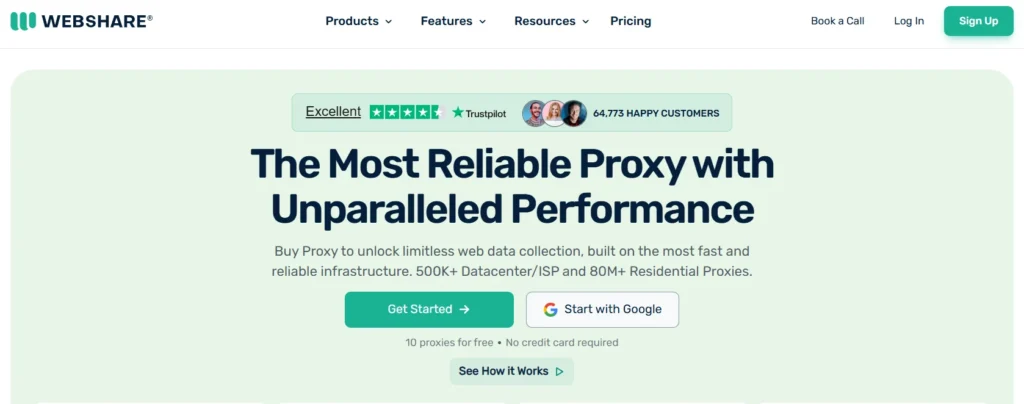
Webshare stands out because it offers great value for the price. I use 5,000 of their datacenter proxies and 1,000 rotating residential proxies, keeping them active all day, every day.
These proxies help keep my Telegram channels running smoothly, allowing me to handle many tasks without problems or slow speeds.
The low cost and reliable performance make Webshare a key part of my daily work.
Why Webshare works well for Telegram:
- Datacenter proxies cost only $0.025 per proxy per month
- Unlimited bandwidth for private proxies
- Their rotating residential proxy pool has grown to 80 million IPs across 195 countries in 2025
- Self-service dashboard to track proxy performance and usage
- 99.97% uptime for all proxy types
- Geotargeting available in 195 countries at the country level
I rely on Webshare’s datacenter proxies for light tasks like reading channels and forwarding messages. For more intense activities, such as joining 500 groups a day or sending mass messages, I switch to their rotating residential proxies.
Success rate:
- 92% with datacenter proxies
- 97% with residential rotating proxies
They also offer 10 free proxies when you sign up, with no credit card required. This is great for testing the service before committing.
Webshare combines solid performance with a reasonable price, making it a reliable option for managing Telegram channels.
Pros
- Lowest price
- Unlimited bandwidth
- 10 free proxies forever
- Instant self-service
- Covers 195 countries
Cons
- Datacenter IPs block faster
- Residential pool smaller than top three
3. Oxylabs

Oxylabs is always fighting for the top two spots, often winning when I need precise control. Their strength lies in sticky sessions and city-level targeting.
I manage 300 Telegram accounts for clients, and I need the same IP for 30-60 days to make the accounts appear natural. Oxylabs’ sticky residential proxies keep the same IP for up to 30 minutes by default, but you can adjust it to 1 hour, 10 minutes, or 30 minutes for perfect control.
Success rate on Telegram: 97-98%.
The price is $8 per GB for residential proxies with a pay-as-you-go option, but you get significant discounts after spending $500 monthly. They also have the highest success rate with Telegram Web and Telegram X apps. Oxylabs offers a free trial for new users, but with limited traffic.
Their proxy pool has 175 million IPs across 195 countries. Geotargeting covers city, state, ZIP, coordinates, and ASN levels. With unlimited concurrent sessions, I can scale without limits.
The average response time is 0.41 seconds. Their mobile proxies rotate every 10 minutes and use real carriers. Datacenter proxies start at $180 per month for 100 IPs. Their support is available 24/7 via chat or email.
Pros
- Best sticky sessions control
- Fastest response (0.4 s)
- Unlimited threads
- Perfect for Telegram Web and X
- City/ZIP targeting
Cons
- Expensive until you spend $500+
- No cheap static IPs
4. IPRoyal
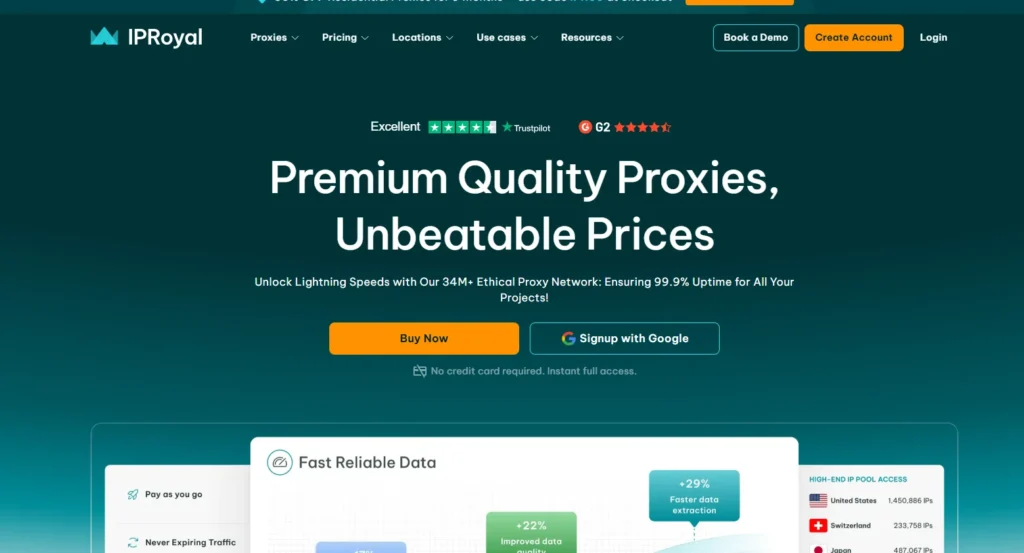
IPRoyal became my go-to provider in 2024 and has stayed in my main rotation since. They offer residential, datacenter, mobile, and sneaker proxies.
For Telegram, their residential and mobile proxies give the best performance.
What makes IPRoyal stand out:
- Static residential proxies from any country start at $1.75 per proxy (with a minimum of one)
- Rotating residential proxies cost $7 per GB with no expiry date
- 4G/5G mobile proxies, launched in 2025, come from real carriers and remain clean for weeks
- Their pool includes 32 million residential IPs and 4 million mobile IPs
- You can pause traffic and keep the remaining GB for later use
- Targeting by country, state, city, and ZIP code is available
- SOCKS5 support works with all the Telegram bots I use
- Proxies are delivered instantly and appear in your dashboard right after payment
I use IPRoyal mainly when I need proxies from countries like India, Indonesia, Brazil, Nigeria, or Pakistan—places where Telegram bans are common.
Success rate: 96-97% for rotating residential proxies and 99% for mobile proxies. Their support responds quickly, even late at night.
They accept payments via PayPal, credit cards, Bitcoin, Ethereum, and USDT. There’s no minimum order for static proxies, so I can test a single proxy from a new country for $1.75 and only scale up if it works.
If I need 500 proxies from a smaller country, IPRoyal is the only provider I trust to have them in stock.
Pros
- Buy one proxy for $1.75
- Traffic never expires
- Strong in India, Brazil, Indonesia
- Instant delivery
- Live chat answers in minutes
Cons
- Smaller total pool
- Mobile pool still growing
5. NetNut
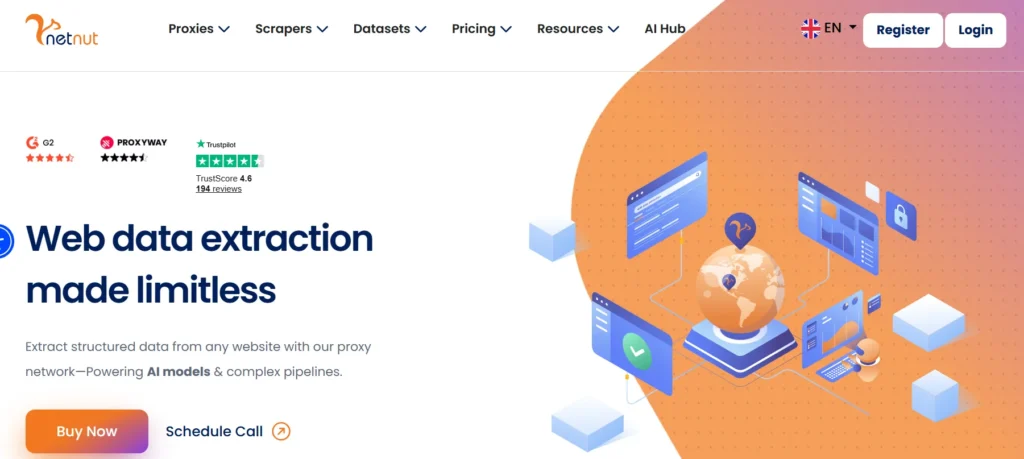
NetNut operates a proxy network based on direct contracts with internet service providers (ISPs) around the world. Instead of gathering IPs from users running background apps, NetNut gets blocks of IP addresses straight from ISPs.
This method provides clean and stable IPs that Telegram rarely flags.
I use NetNut’s static residential proxies, also known as ISP proxies, for my main business channels. One IP can stay clean for 90-180 days without any issues.
I keep the same IP for my largest channels that generate income daily. The rotating proxy pool works well for bulk joining or messaging campaigns.
What stands out:
- Static ISP proxies cost $15-$20 per IP per month with unlimited bandwidth
- Rotating residential plans start at $300 for 20 GB, then $12 for each additional GB
- Their proxy pool includes over 85 million IPs from 200+ countries
- City and ASN targeting are included in all plans
- True one-session routing ensures that every request from the same session uses the same IP without needing extra settings
- No extra charges for bandwidth overages on static plans
- 99.9% uptime guarantee with SLA (Service Level Agreement)
- Dedicated account manager for plans over $500
Success rate: 95% for rotating residential proxies and 99% for static ISP proxies. When I need an IP to stay consistent for months on high-value accounts, NetNut is my go-to option.
They also offer mobile proxies from real carriers, but I prefer static ISP proxies for long-term work. Payment options include credit cards, PayPal, wire transfer, and cryptocurrency. They also refund unused traffic if you cancel early.
Pros
- Static IPs last 90-180 days
- Direct ISP source (very clean)
- Unlimited bandwidth on static
- Perfect for main money channels
Cons
- Minimum $300/month
- No small plans
- Rotating costs more per GB
6. Rayobyte
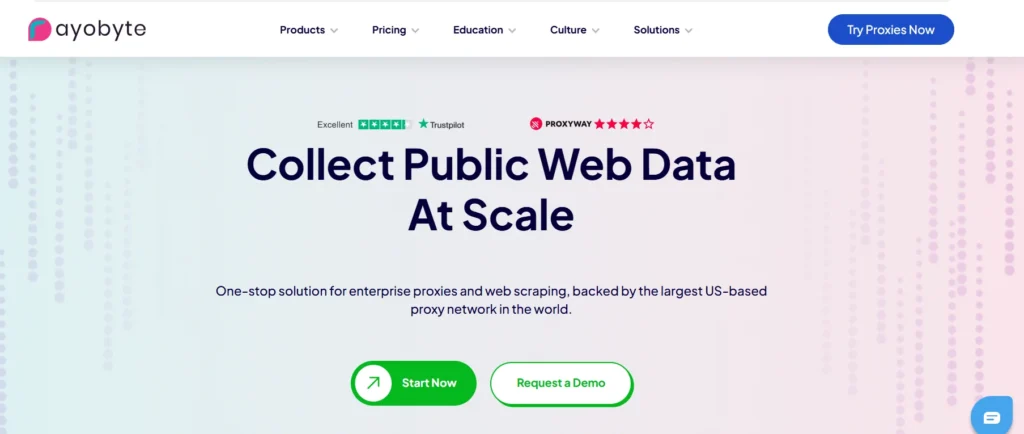
Rayobyte, previously known as Blazing SEO, rebranded in 2022. They source all their IPs through legal channels and avoid shady traffic, which helps keep their mobile proxy pool reliable when others fail.
Their mobile proxies are sourced from real 4G/5G carriers in the United States, Europe, and parts of Asia. Rotation happens every 1 to 30 minutes, depending on your settings.
I use Rayobyte's mobile proxies when I need to create 300-500 new Telegram accounts daily for clients. Telegram rarely blocks real carrier IPs.
Key points:
- Mobile proxies cost $15 per port per month with unlimited bandwidth
- Each port provides one dedicated mobile IP that rotates within a pool of 5-10 million addresses
- Datacenter proxies cost $1 per IP per month with unlimited bandwidth
- Their rotating residential proxy pool, added in 2025, costs $4 per GB
- Their proxy pool covers 170+ countries, focusing on US and EU mobile carriers
- The dashboard shows real-time ping, carrier name, and city for each port
- Instant activation after payment
- Supports SOCKS5 and HTTP protocols
- They own their own ASN and hardware in multiple locations
Success rate:
- Mobile proxies: 98-99%
- Datacenter proxies: 90% for light tasks
When I need to manage accounts at scale or warm up fresh numbers, Rayobyte’s mobile ports perform the best. Their support responds quickly and sometimes upgrades ports for free if a carrier starts getting flagged.
They accept payments via credit cards, PayPal, and cryptocurrency. There is no minimum order, so I can buy a single mobile port today and add more as needed.
Pros
- Cheapest real mobile ($15/month unlimited)
- Best for mass account creation
- Own hardware and ASN
- Instant activation
Cons
- Mobile is mostly in the US and Europe
- Residential pool is new and small
7. Soax
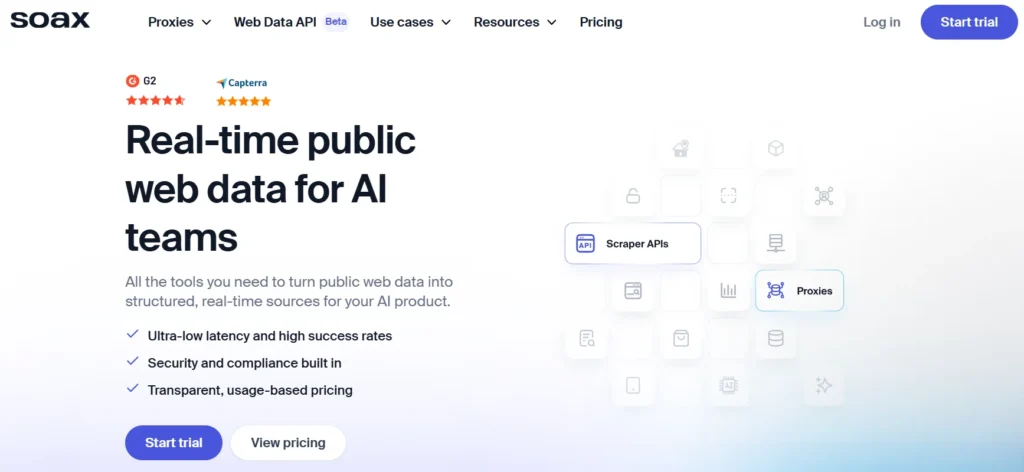
SOAX has earned its reputation by offering rare locations and precise filtering. While larger providers focus on traffic from the US and Europe, SOAX keeps thousands of clean IPs in countries that many others overlook.
Their residential proxy pool covers 195 countries, but what really sets them apart is their coverage in regions like Africa, the Middle East, Central Asia, and parts of Latin America.
When I open their dashboard and search for cities like “Lagos,” “Karachi,” or “Cairo,” I see 5,000 to 15,000 active IPs available right away. Larger providers might show zero or just a handful of IPs for the same cities.
What you get:
- Residential rotating plans start at $6.60 per GB (minimum 15 GB package)
- Mobile proxies cost $3 per port per day or $99 per month for unlimited traffic on one port
- The pool includes over 120 million residential IPs and 8 million mobile IPs in 2025
- You can filter by country, region, city, postal code, or even specific ASN
- Sticky sessions can be set from 30 seconds to 30 minutes (you choose the time)
- No limits on concurrent sessions, unlimited threads on all plans
- Filters for Wi-Fi and mobile connections let you choose only home IPs or only 4G/5G
- The dashboard shows success rate, response time, and active nodes for each location in real time
- You can export lists in TXT, CSV, or pull them directly via API
I use SOAX when a client needs large numbers of accounts from countries like Bangladesh, Kenya, or Vietnam within a week. No other provider on this list can deliver that volume from those countries in such a short time.
Success rate:
- 94% to 96% for residential rotating proxies
- 97% for mobile proxies
While the success rate is lower than Bright Data or Oxylabs, SOAX is the only provider that can deliver IPs from countries like Pakistan, Egypt, Ghana, or Uzbekistan on time.
Their support is available 24/7 via live chat and can usually fix dead nodes in minutes. They accept payments via credit cards, PayPal, WebMoney, and cryptocurrency.
You can test any location with a 3-hour trial for $1.99, which gives you 100 MB enough to check if the IPs work for Telegram login and joining.
SOAX is ranked seventh overall because there are larger proxy pools, but when you need IPs from countries that most providers don’t cover, SOAX is the best option, with no competition.
Pros
- Best for rare countries (Africa, Pakistan, Egypt)
- City and ASN filtering
- Flexible mobile pricing
- Clean dashboard
Cons
- Success rate 94-96 % (lower than top)
- Minimum package size for GB plans
Free Proxy Options That Still Work in 2026
I don’t recommend using free proxies for serious work, but I know many people still need them for quick tests. Here are the free sources I use:
- Webshare – 10 permanent free proxies (shared datacenter). Good for checking if your script works.
- ProxyScrape – A free list updated every 5 minutes. Around 5-10% work with Telegram at any time.
- Free-Proxy-List.net – A simple text list. Filter for HTTPS and test up to 50 proxies at once.
- Spys. one – Filter by country and anonymity level.
- Telegram official MTProto proxies – Go to Tools → Settings → Data and Storage → Use Proxy → MTProto proxies. Volunteers run these free MTProto servers. They only hide Telegram traffic, not your real IP for other apps, but they’re 100% free and often faster than a VPN.
Warning: Free HTTP/SOCKS proxies get blocked quickly after 20-30 actions. Use them only for testing, not for real work.
My Personal Ranking for Different Needs
👉Need the highest success rate and don’t mind the price: Bright Data
👉Need the best price for thousands of proxies: Webshare
👉Need long sticky sessions (30-60 days with the same IP): NetNut or Oxylabs
👉Need cheap mobile proxies: Rayobyte
👉Need proxies from rare countries: SOAX or IPRoyal
👉Just testing or for a small personal channel: Webshare free + MTProto
More Proxies to Checkout:
- Best Proxies for YouTube
- Best Proxies For Amazon
- Best Proxies for Android
- Best Socks5 Proxies
- Best Instagram Proxies
Final Words
Telegram changes its blocking system every few months. What works today may need some adjustments tomorrow. The seven providers listed above have managed to keep working through every update since 2021. I still test new companies, but none have made it into my main list in the last 18 months.
Pick one from the list, start with a small test, track the ban rate for a week, then scale up. This simple process has saved me more than $40,000 in the last two years.
If you run Telegram at scale, proxies aren’t an expense. They’re insurance.





![9 Best Residential Proxies 2026 🌐 Our #1 Pick [99.3% Success Rate]](https://www.affiliatebooster.com/wp-content/uploads/2024/10/Best-Residential-Proxies--768x405.webp)